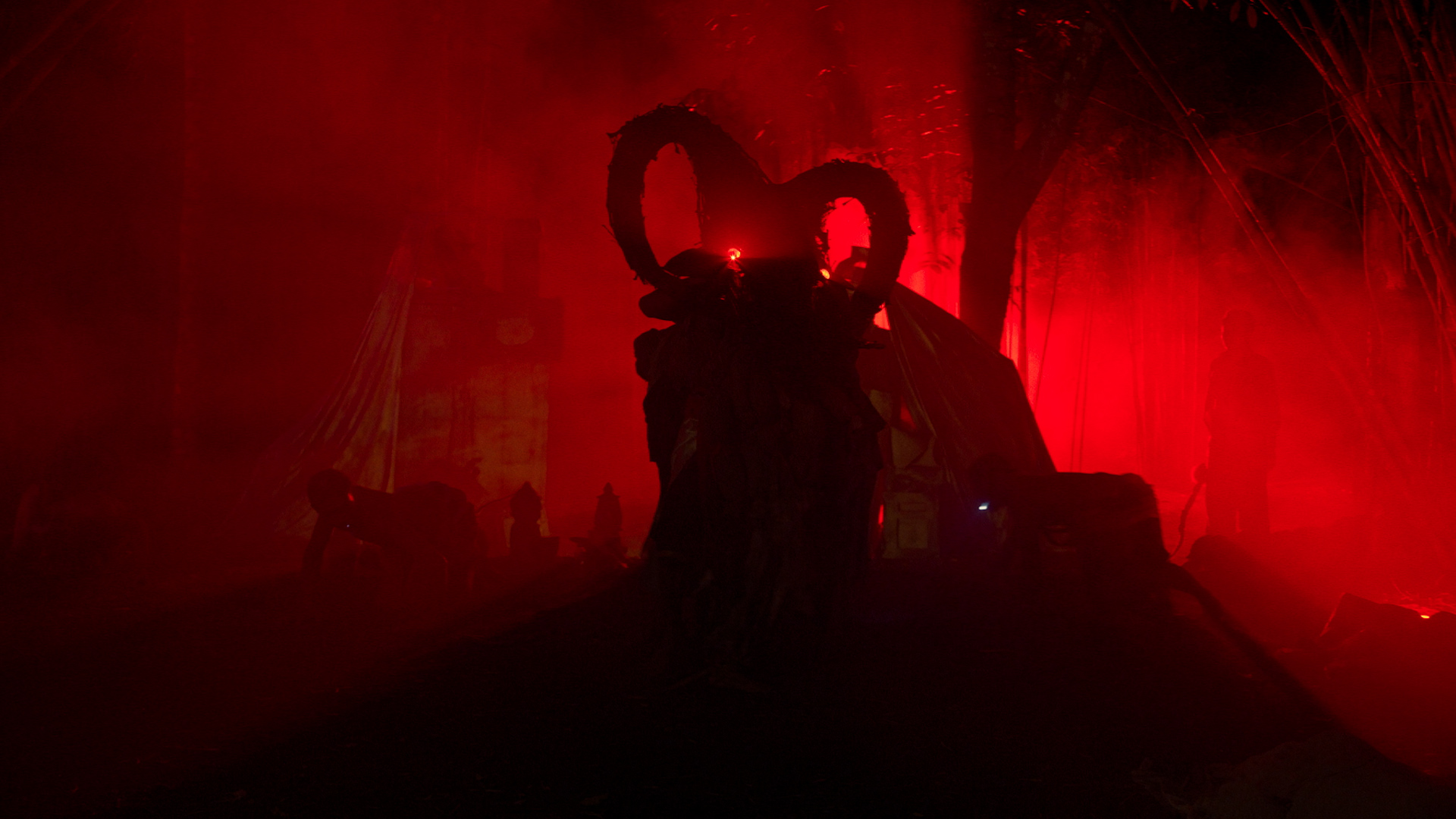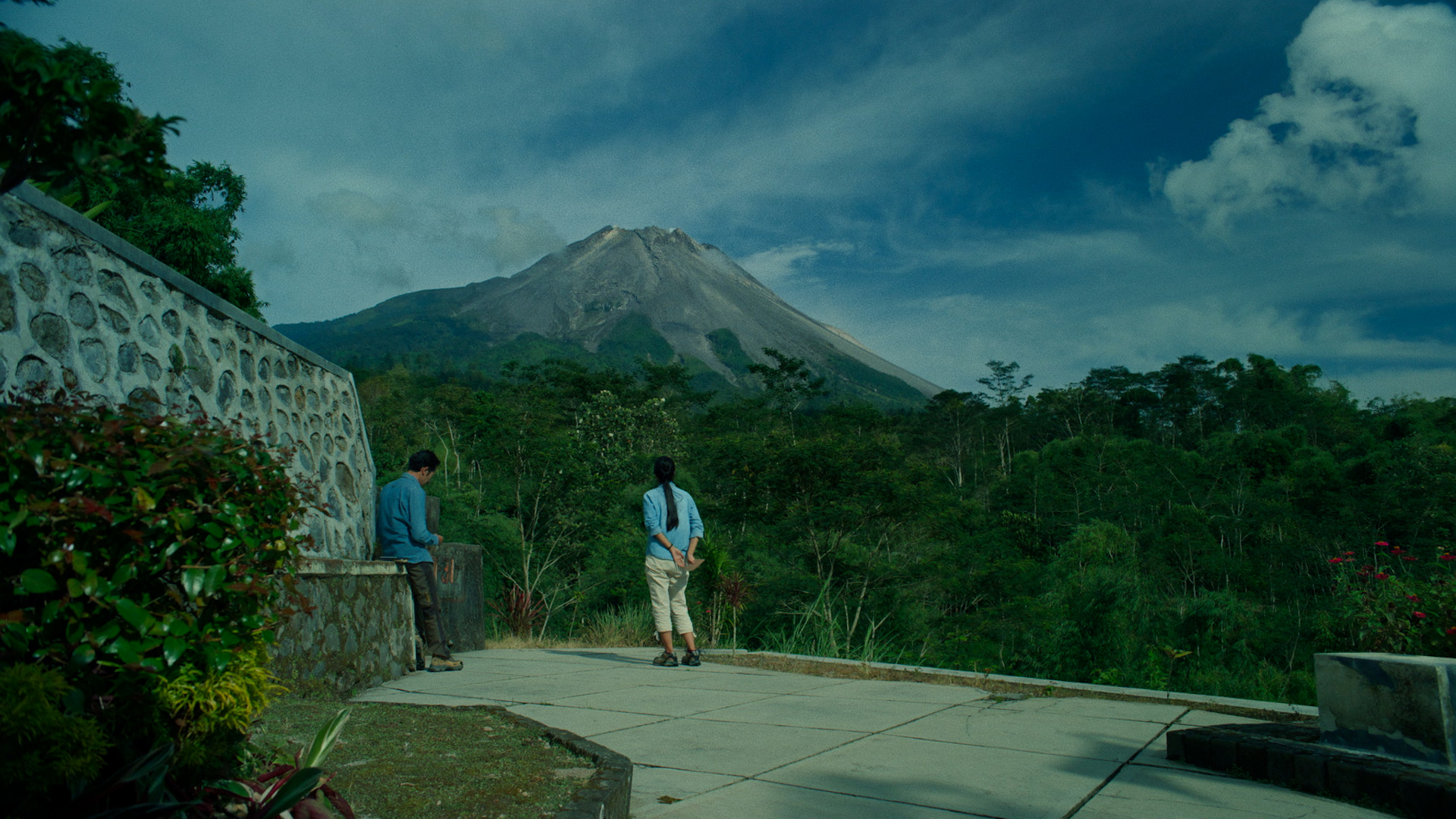Mountain on Fire
On Riar Rizaldi’s Monisme
Phuong Le


Monisme
Director RIAR RIZALDI, Year 2023, Country INDONESIA, QATAR
Towering over Riar Rizaldi’s hypnotic first feature is the fearsome Mount Merapi, Indonesia’s most active volcano, whose major eruption in 2010 left hundreds of deaths in its wake. Monisme occasionally takes in the full magnificent view of the summit lava dome, yet the film is also interested in how images of Mount Merapi have been produced and displayed in other contexts. Here, the stratovolcano range appears on computer monitors pored over by geologists as well as on the walls of nocturnal roadside restaurants. In black and white archival photographs, the mountain stands solemnly behind smiling colonial Dutch explorers. Shot in the depth of a dark forest, one particularly striking sequence lingers on a curtain of LED screen strips which plays videotapes of cascading, red-hot magma. The contrast between destruction and quiet calm is eerie–and enthrallingly beautiful.
Spanning across visual media, the varied, interdisciplinary representations of Mount Merapi buck against anthropological–and often Western–studies of indigenous geological sites, approaches that fail to reconcile facts and figures with myths and traditions. By incorporating documentary testimonials into a loosely fictional structure, Monisme succeeds in grounding its exploration of Mount Merapi in lived-in experiences, while deliberately resisting the conventional and reductive impulse to “solve” the enigma of the stratovolcano. In casting actor Rendra Bagus Pamungkas in the triple role of a volcanologist, a sand mixer, and a shaman, Rizaldi filters his view of Mount Merapi through a multitude of lenses. While Pamungkas’s volcanologist perceives the possibility of incoming eruptions as a rational continuation of the cycle of life, his sand mixer character has a more practical relationship to these foreboding events, a view that reflects the on-screen interviews with workers on the site. An ironic paradox looms over the latter case: the workers acknowledge that sand mining destabilizes Mount Merapi’s dormant state, yet their jobs are also made possible by the rocks and materials created by past eruptions. Diverging from earthly preoccupations, Pamungkas’s shaman speaks of Mount Merapi as a portal to another realm, one that mirrors the characteristics of the present.
Filtering the scientific, the practical, and the folkloric through Pamungkas’s performances, Monisme fights against a rigid hierarchy of binaries or congruities, for a co-existence of diverse perspectives. Such eclecticism exists in the visual language, too. When asked about their favorite films, a sand mixer shares that he loves outdoor screenings, especially those of Barry Prima films. Blessed with a Greek-god physique and stunning martial arts skills, Prima shot to fame in Indonesia as an action star, but also starred in horror films such as Primitif (1978). In this classic of the cannibals-in-the-jungle subgenre, three anthropology students go on a research trip to a swampy rainforest, only to be hunted down by bloodthirsty wild animals and an indigenous tribe. Primitif presents itself as exploitation and pulp, but the tension it depicts between science and nature–as well as its aesthetics–are also present in Monisme. While the static and measured compositions of Rizaldi’s film bring to mind the works of Apichatpong Weerasethakul or Laz Diaz, Monisme also echoes the unease of genre offerings like Primitif, where unimaginable horrors can spring within the lush forest. This time, however, the threats that lurk in the jungle are a state-sanctioned paramilitary group, who exerts violence on both a corporeal and environmental scale.
Monisme’s diverse ideas and images come together at the end in a Jathilan dance, a traditional Javanese ritual that promises to transcend boundaries and to connect the performers with unseen mystical forces. As the scenes leading up to this cathartic end are primarily cast in a cool palette, the red lighting that circles the young dancers as they writhe in a trance feels like an eruption of visceral energy. In the same way that this dance brings a sense of harmony to what seem like contrasting philosophies, Monisme also erases categorization, beckoning viewers to perceive Mount Merapi in its fiery totality. In our current economy of funding and exhibition where works from non-Western filmmakers are so often tasked with the burden of representation, it is refreshing that Rizaldi’s film takes the radical approach of shielding the mystery of Mount Merapi from simplistic deciphering.
Phuong Le is a Vietnamese film critic based in London. Her writing can be found in The Guardian, Sight & Sound, and other publications.
This text was commissioned by Open City Documentary Festival to accompany the screening of Monisme at Close-Up Film Centre, 9 September 2023.